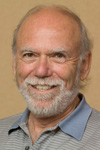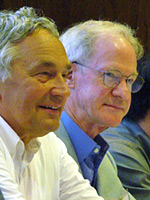Director's Corner
2 November 2006
 Barry Barish |
Worldwide Peer Reviews for ILC Detector R&D
Reaching the science goals for the ILC will require that both the collider performance and the capabilities of the detectors be consistent with the parameters set out by the ILCSC parameters group. For the ILC detectors, this will require improvements in both spatial and energy resolution. Around the world, experimentalists are pursuing an impressive and ambitious R&D programme that targets these goals, with some overall coordination provided through the Worldwide Study (WWS). The WWS sponsors an annual Linear Collider Workshop (LCWS) that is organized jointly with one of our triannual GDE meetings, providing the detector community with both a worldwide workshop and a forum for interactions and joint meetings with the ILC accelerator community. The WWS has also formed a Detector R&D Panel, chaired by Chris Damerell, which has been given responsibility to implement a new systematic procedure for peer-reviewing ILC detector R&D on a worldwide basis.
 Francois Richard, WWS co-chair, and Chris Damerell, chair of the ILC Detector R&D Panel. |
The World Wide Study is co-chaired by Jim Brau (University of Oregon), Francois Richard (LAL-IN2P3) and Hitoshi Yamamoto (Tohoku University). This group coordinates the work of the three regional studies, ECFA, ALCPG and ACFA, for the ILC detector community. The World Wide Study Organizing Committee established a Detector R&D Panel to promote and coordinate detector R&D for the International Linear Collider. This panel has already issued an important report earlier this year that nicely summarises the elements and the status of the worldwide detector R&D programme, as well as singling out some funding issues.
The R&D Panel is now taking on the task of organising regular reviews of the R&D projects that are in progress world-wide. The main purpose of these reviews will be to maintain and overview the R&D, monitor the milestones to completion and note unnecessary duplications or missing items. The tentative schedule of reviews is divided into four main technical areas that will be conducted one at a time, in series and in conjunction with regional or international ILC workshops.
- Tracking (Beijing, February 2007)
- Calorimetry (LCWS DESY, June 2007)
- Vertexing (Fermilab, October 2007)
- Particle ID, muon tracking, solenoid, beam diagnostics and DAQ (Asia, February 2008)
The new system of reviews is intended to put the detector R&D on a more even basis with the ILC accelerator R&D, which is organised through worldwide task forces by the GDE Research and Development Board (RDB), chaired by Bill Willis. The GDE RDB and Executive Committee have endorsed the new detector R&D reviews. We feel that this new programme is an important step toward developing a globally coordinated effort for ILC detector R&D. This process will help provide some global coordination, in advance of the formation of actual detector collaborations.
The GDE will be one of the recipients of the review reports, but our role in this process will only be advisory. We will provide some administrative support, monitoring tools, and other resources that will help enable the reviews and other work of the Detector R&D Panel. It will be important to include impartial experts from outside the ILC community in these reviews, and in that regard, we hope to obtain endorsement, as well as financial support from the funding agencies, for outside reviewers at the earliest possible time. Toward this end, Chris Damerell will present the new detector peer review plans to the Funding Agencies for the Linear Collider (FALC) at their next meeting at KEK in late November.
-- Barry Barish